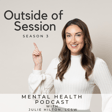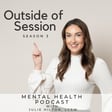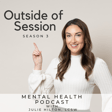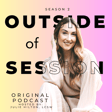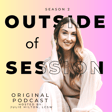Become a Creator today!Start creating today - Share your story with the world!
Start for free
00:00:00
00:00:01

SAD- Seasonal Affective Disorder
Winter Blues starting to seem like more than just a bad day? SAD is real, y’all! Julie shares how she finally came to accept her own SAD, what common symptoms are, and how she takes really good care of herself to stay on top of it now!
Follow me on Instagram @empower_counseling
Visit www.empowercca.com
Transcript
Introduction to 'Outside of Session' Podcast
00:00:06
Speaker
Welcome to outside of session. I'm your host, licensed clinical social worker and therapist BFF, Julie Hilton. We're going to cover all the things here, whether it's mental health, entrepreneurship, relationships, trauma, or just life. Nothing is off limits. Hopefully you'll laugh a little and learn a lot, but most importantly, feel encouraged on your journey to live empowered.
Podcast Growth and Enjoyment
00:00:32
Speaker
Hey everyone and welcome back to another episode of Outside of Session. This is like the number seven episode. I think this is the seventh episode I've recorded and I feel like I'm finally getting into a little bit of a groove.
00:00:47
Speaker
I'm learning how to do all this editing and stuff, and I'm actually starting to have a little bit more fun with it.
Starting New Projects: 'Done is Better than Perfect'
00:00:54
Speaker
I feel like if I keep this up and keep consistent with it, then in a couple of years, or who knows how long this is gonna go on, but I feel like I'm gonna go back and look and re-listen to some of these first episodes and be like, man, I have grown so much. And that really is what I'm hoping for. So if you, this is just a reminder that if you have a project that you're wanting to get started on,
00:01:16
Speaker
Just go for it. It does not have to be perfect to get started. Done is better than perfect. So whether it's a podcast or a blog or a business or whatever it is that you're thinking about doing, here is your random reminder to just get started. Just do it.
Discussing Seasonal Depression Early
00:01:33
Speaker
Just take a leap of faith and just go for it.
00:01:35
Speaker
So today we are going to be talking about a new topic. We're going to talk about seasonal depression, seasonal affective disorder, however you want to phrase it. And, you know, when I was thinking about recording this episode, but I was going to wait and do it next fall when people start to experience seasonal depression.
Recognizing Seasonal Depression Symptoms
00:01:55
Speaker
But I actually wanted to go ahead and do it now because today is, let's see, today is March 6th when I'm recording this. And here in Atlanta for the past week or so, we've been having weather that's in like the 70s every day. Everything is in full bloom. There's pollen everywhere. Everybody in Atlanta also knows that this is fake spring because at some point in March, it will get down below freezing again. And if it's gonna snow here, it's probably gonna be in March.
00:02:23
Speaker
But just because like the weather is so nice and everybody is just like soaking up a little bit of warmer weather, I thought now would actually be a good time to record this and release it because a lot of people are probably coming out of their seasonal depression right now.
00:02:40
Speaker
And sometimes it can be really, really hard to notice when it's coming on in the fall when the weather starts to get colder. Like the symptoms of seasonal depression can be really, really hard to label because they come on so gradual. Not just that, but it's also mixed in with a very hard season for a lot of people, which is holiday season. So there's a lot of
00:03:02
Speaker
There's a lot of sadness and a lot of loss and a lot of grief around the holidays for a lot of people. So when you're also feeling all of those emotions, it can be really hard to identify that you're also having symptoms of seasonal depression.
Personal Discovery of Seasonal Depression
00:03:15
Speaker
So I thought, why don't we start with where we are now? Hopefully I'll release this sometime in the spring or early summer.
00:03:22
Speaker
Um, when maybe you can start to notice a shift in yourself that shows that you're coming out of seasonal depression and maybe that's actually easier for some people to identify. So I want to share with you my own story. I definitely have seasonal depression. Um, and it's taken me some years to be able to put that language to it because number one,
00:03:45
Speaker
Ten years ago. I probably wouldn't have even believed how like real of a thing it was like I would have thought that like Yeah, a lot of people don't like winter or whatever But I I really didn't realize like chemically what happens inside of you to cause such a shift in your your mood and your outlook on life that kind of thing and
00:04:05
Speaker
So what I've always known about myself, I would have just called it that I hated winter. I would say that I'm such a summer girl that I hate when the summer is gone. But that's all I would ever really call it. And then in 2016, I moved out of the state and was gone for a couple of years. And then in 2018, moved back to the Atlanta area. And I remember that first winter here being like,
00:04:30
Speaker
man, it did not used to rain this much in Atlanta. Like I really felt like Atlanta was becoming a very like, dreary, wet, so many overcast days. Like I just don't remember it being like that before. And
00:04:48
Speaker
Yeah, like I just really started to realize like it's not just that I hate winter It's just that that that I really feel like the climate here has changed a lot. So one year I think this was Maybe the next year like maybe this is 2019
00:05:03
Speaker
Yeah, I think this was like the winter of 2019. So in like January of that year, well, I guess it would have been January of 2020,
SNRI's Role in Symptom Management
00:05:12
Speaker
I have this really weird chronic condition going on that involves some chronic nerve pain. And I saw my primary care physician and I've seen a lot of doctors about it. Nobody can ever help me, but my PCP was like, have you ever tried antidepressant for nerve pain? And I was like, no, I've never even heard of that before.
00:05:32
Speaker
And she was like, yeah, there's a whole classification of medications that are technically antidepressants that they get prescribed off-label to help with nerve pain. So I was like, yeah, I'll try it, whatever. So she put me on what's called an SNRI, which is a little bit different than an SSRI, but works the same way, basically. It's called Cymbalta. And she put me on a really low dose to see if it would help with the nerve pain that I was experiencing.
00:05:58
Speaker
And then we set a follow-up visit for like two or three weeks after that. So I went in for my follow-up a couple of weeks later and she was like, so how's the nerve pain? And I was like, well, let me tell you, the nerve pain is the same, but I think I have depression. And she was like, really? And she was super supportive, very open to listening to what I had to say.
00:06:16
Speaker
And I was like, yeah, my nerve pain is not any better But I realized how much my mood has improved in the past couple of weeks So much so that I didn't realize like what a dark place I was getting into and this feels like completely different and she was like Yeah, absolutely stay on it then so I was like, okay I know for a fact this usually comes around the winter and so she was like try it for a couple of months and if you're ready to wean off of it when summer gets here we can do that
00:06:47
Speaker
So what I did was about May, I think, I started to titrate off of it, which means that I just started to lower the dose and I did it, you know, with my doctor, of course, and she told me how to taper off of it so that I wouldn't experience the side effects of it. And by the time I came off of it, because we were almost in summer, I never saw any side effects, but I also did not feel my mood tank back down, which to me really showed me that it was seasonal depression.
Key Symptoms of Seasonal Depression
00:07:20
Speaker
Because of that, and since then, I've really been able to, now that I had a diagnosis, I had some language to put to it, it was also easier for me to start putting language to my symptoms and exactly what I was experiencing. So that's one of the things that I want to talk about today because I think a lot of people probably have seasonal depression and they don't even know how to describe it.
00:07:43
Speaker
to their physician or to their therapist or to their friends, whoever they could get help from because they don't have the words to put with it. So a lot of times we think of depression, we think of sadness and crying and not being able to get out of bed. But of all the clients I have that have like clinical depression,
00:08:01
Speaker
Sadness, crying and not being able to get out of bed is a very small portion, a very small portion of what people experience. Most of the time it is completely different symptoms. And so I'm going to go through a couple of those that I know that I particularly experience when my seasonal depression kicks in. The number one, 100% is irritability.
00:08:23
Speaker
It's just like this underlying like anger towards everything and everyone for no real reason. Like I'm just a very negative person when this comes on. And normally I'm a pretty positive person. Like I'm a pretty glass half full, pretty upbeat kind of person. I'm still a very introverted, but I'm still a positive person, right?
00:08:46
Speaker
Um, and when I noticed this irritability kick in, there are days that I just cannot get out of this cycle of just being frustrated and irritable with everyone around me. And I very much can recognize that they haven't actually done anything to get on my nerves, but my nerves are just shot. They're just.
00:09:07
Speaker
I don't really have the capacity or the patience with people and that's not a good quality to have. And then that irritability turns towards to myself because I know that I have no reason to be frustrated with people in my life that are not doing anything wrong. And so I'm really irritable with myself. Ooh, my earring just fell out. Um, I'm really frustrated with myself
Mood Improvement with Medication
00:09:25
Speaker
for feeling that ways towards them. The second thing, so irritability is number one. The second thing that I have really realized is my biggest symptom of my seasonal depression is y'all, I swear I have like this,
00:09:37
Speaker
I swear I have like an existential crisis where I start questioning everything.
00:09:47
Speaker
I feel like I don't know what the point is of anything that we do. Every day that I go to work, even though I really, really enjoy my job, every day I'm just like, what is the point of this? When it comes to helping people heal, I'm barely putting a drop in the bucket. People are still going through so many hard things. I start having all of these questions about, is this all that life has to offer? We're stuck in this cycle of American dream, which is really the American nightmare.
00:10:14
Speaker
I definitely don't have, I personally, and there's nothing shameful about it if you do, but I don't specifically have a lot of or any suicidal ideations, but I very much have this desire to like run away, live under a rock, isolate myself from everyone and just like live in a tent in the woods or something like that, where I'm just away from everyone, away from the pressures of life. And it is a very real feeling where I just like question everything.
00:10:42
Speaker
Another thing that I noticed is that I have just really low energy Like I think my spirit animal is a bear because my body just like wants to hibernate all winter long I noticed that I just don't have as much energy to do like daily things and when you think about like it starts getting dark at 5 p.m. When we're coming out of summer where it's not dark until like 8 30 like you're losing so many hours of your day Like no wonder my body is like it's dark. It's time to go to bed
00:11:12
Speaker
So that's another thing that I noticed is like having a lot of low energy. So those are the three things that I really noticed about myself that I don't know that the average person would be able to say like, Oh, that's, that could technically be a, that could be a sign of seasonal depression.
00:11:27
Speaker
So like I said, I started this SNRI, which stands for serotonin norepinephrine reuptake inhibitor, which is a mouthful, I know. But when I started taking the SNRI, I swear it feels like it, it feels like it lifted like 80% of those feelings for me, which helped me stay engaged in my life. And it helped me feel really, really present.
00:11:56
Speaker
And that's one thing when I talk with my clients about if they have questions about maybe they should start a medication, maybe they should start an antidepressant. The number one thing that I always hear is that I don't want it to numb me out. I don't want it to make me feel like somebody that I'm not. I don't want to be a zombie. And my response is always that if you are on the right medication with the right dosage,
00:12:18
Speaker
you should feel more like yourself, not less like yourself. Like all these feelings that I'm having, like this irritability, I don't feel like myself. I feel like it's something that I can't shake. It doesn't matter how many positive affirmations and things that I do, I feel like I cannot shake these feelings. But when I take the right medication at the right dosage, I feel like I'm back to myself and like I'm functioning like normal.
00:12:45
Speaker
I still hate winter. I still hate the rain. When, especially here in Atlanta, when we go stints for days of just like rainy, gloomy, cold, I still have a little bit of those symptoms. Like I struggle a little bit more if we haven't had a single break in those days, a single bit of sunshine. But for the most part, like taking this medication really does help me get through it because I feel so much more like myself.
Strategies for Managing Seasonal Depression
00:13:12
Speaker
So this year, so that first started in 2020. And then the summer like the January of 2021, I was also taking it because I was like, Why would I not at this point? So this year, I did the same thing. But this year, I started to prep myself for a little bit better all the way back in like September when those first autumn days started to come and
00:13:34
Speaker
The days start to get a little bit shorter. It starts to get cooler in the evening. I was like, okay, I know this is probably coming because I know my body really, really well now. I want to give myself the best chance that I have of having a good winter, right? So I started doing other things way before I started taking my medication again just to like take really good care of myself. So the first thing I did was I started walking. I really started prioritizing getting my steps in every day.
00:14:02
Speaker
And that really, really helped because movement is so good for our mental health. Then another thing I was doing is trying to get as much sunshine on my face as I could on days that the sun is out. And so I'm still doing that even now, even in March. Every day that the sun is out, I try to get at least 15, 20 minutes of sunshine on my face with sunscreen because I'm not trying to age here or get more sunspots than I already have.
00:14:27
Speaker
But trying to get some sunshine on my face as much as possible really really does help your body. Another thing that I do is that I take vitamin D because a lot of people's vitamin D is really low and I've had mine tested multiple times and mine is always like super super low to the point that I've taken prescription vitamin D before. But I always try to take a vitamin D.
00:14:49
Speaker
I also have like a light therapy lamp that I probably should use a little bit more, but sometimes I honestly just forget to do it. But that's another thing to have in your toolkit. There's plenty of studies that show that it can help with seasonal depression. And another thing that I do is I just allow myself to sleep more.
00:15:07
Speaker
So in the summer, there's very rarely a day that I sleep past like six 30 in the morning. Like it's just, I'm, I'm a morning person. So I usually just, I'm up even on the weekends with my dogs with just like ready to start the day. But in the winter this year, I've just given myself permission to sleep in. And I've actually found that on the weekends, I was sleeping until like eight o'clock, which I know is not late for a lot of people. But for me, that seems like
00:15:32
Speaker
half of my day is going already. But I just have like, given myself permission that if my body wants to hibernate, like I'll just do it. And also going to bed a lot earlier, like there's times in the winter that I go to bed, like I'm in bed at like 830. And I have no shame for that because I feel like that's just what my body needs.
00:15:50
Speaker
So by this year, even though I started doing all of those things in September, and I felt like I had a really solid routine, and I like the holidays okay. I'm not a crazy Christmas and Thanksgiving person, but I don't necessarily have any negative emotions attached to them. And so I was looking forward to them just fine, but by December, I still was able to recognize that I need my medication. I need to go ahead and start this. And so I did not hesitate to call my doctor and say, hey, it's time.
00:16:18
Speaker
and she never has a problem like prescribing me again. Like we know what works for me. I start on the same dosage every year. And about this time, every year I'll start to wean myself off of it. So probably by April, I'll come off of it and I'll be fine for the entire summer.
00:16:34
Speaker
Like it, it's honestly really crazy to me because last week when the weather started getting warmer, I was like, don't get excited. Don't get excited. It's not going to last. And everything I'm telling you, it's in full bloom here today was 79 degrees. It was beautiful and it was sunny. And I had this moment over the weekend where I literally could feel my mood shift.
00:16:59
Speaker
It's really hard to describe, but I know that it's not just my medication working. It is literally like, it's this feeling of all these good emotions that I've been able to feel during the winter because of my medication. It still feels like they were somewhat behind a curtain or something. Like I could get to them, but not fully get to them. And now I feel like I have full access to them again.
00:17:26
Speaker
Like I feel like they are my feelings again. And I can't even begin to describe like what that shift in the mood is, but I literally can feel my body chemistry changing. It's almost like a feeling of hope returning or like being fully present again. I don't know how to describe it, but it's a very real and very noticeable shift.
00:17:53
Speaker
So if that's where you are right now, and you're not just having an excitement for the spring and the warm weather, but a genuine lift in your spirit or change in your system, you can just feel it, you probably have seasonal depression. And if you take a look back over the past three or four months, I want you to take inventory of what your mood has been like if you're starting to notice all these positive feelings right now, really be able to put some verbiage to, well, what has it been like for the past three or four months?
00:18:23
Speaker
Was it really just because I think we can always say like, yeah, but I'm going through this really hard thing right now, but we go through really hard things in the summer and we don't respond to it the same, right? So was it really just that situation and the problems that have come up lately? Is it the holidays that you don't really like?
00:18:41
Speaker
Or is there more going on than just a holiday season and it's actually something chemically going on inside of you? So notice like what you are feeling now and notice what you haven't felt in a while and that is how you can start to put some language to what's going on in your system.
00:18:59
Speaker
If that is the case, then you notice a big difference. I want you to start paying really close attention to the possibility next fall that maybe you have seasonal depression and maybe if you're having better awareness about this, you can do something about it. You'll be better able to identify your symptoms in the fall and having an awareness of what's going on inside your body. And if necessary, you can talk to your doctor about it next winter so it doesn't have to be such a hard season for you.
Episode Conclusion and Disclaimer
00:19:28
Speaker
So if you relate to any of this, if you have any other questions about seasonal affective disorder, if you have any comments, make sure you leave a comment below, like and share this episode so that it can reach other people and we'll talk to you next time.
00:19:43
Speaker
Thanks for tuning in to this episode of Outside of Session. Remember, while I am a licensed therapist, this podcast is not a substitute for individual therapy. The contents of this episode are for educational and entertainment purposes only. If you are having a mental health emergency, please dial 911 for immediate assistance or dial 988 for the suicide and crisis lifeline.
